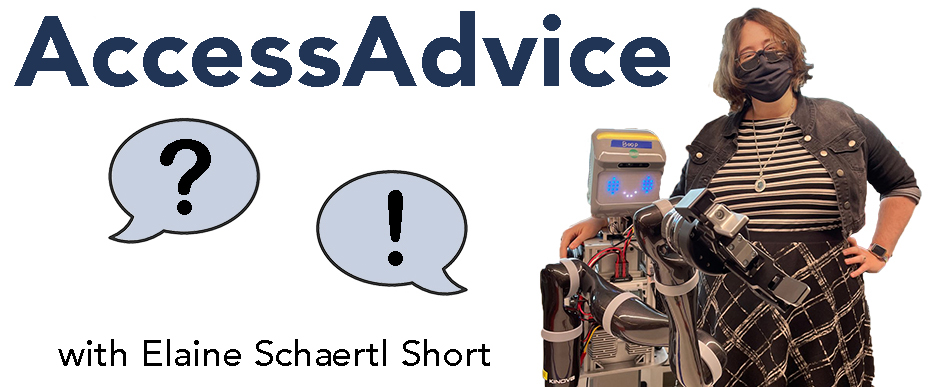
Dear Elaine,
I have three questions relating to the state of inclusion in computing in our current country's climate:
- What advice do you have for people doing research/work on accessibility about branding their work and selecting future projects? Should we be trying to "diversify" ourselves (do non-disability focused work) or rebrand our work to make the accessibility focus less obvious?
- Do you think that the field of accessibility research will exist and/or recover in 5 years? 10 years? Does your answer change for academia versus industry research?
- What are the best ways we can gain people's empathy/convince people this work is still important (notably, disability does not respect partisan lines)?
From a junior researcher who is hoping to start their career in the next 1-2 years
Dear Junior Researcher,
First, I want to validate your anxiety: it’s a scary, stressful time to be a researcher, especially in academia. Folks with much more seniority and power than you are worrying about many of the same things and facing many of the same impossible questions with overwhelming-feeling stakes. I hope you are finding ways to take care of yourself—through the usual small comforts, connection to your communities, and necessary self-maintenance.
I will come back to the practical advice in a moment, but first I want to say that one of the amazing, overwhelming things about research is that you’re not playing a 5 or 10 year game. You’re not even playing a 20-year game. You are part of a lineage of thinkers that goes back hundreds of years in the formal western system and even longer through the many other intellectual traditions, both written and oral, that inform our current understanding of the world. We spend a lot of time focusing on the next paper, the next milestone, or the next thing on our to-do list, but the purpose of that day-to-day work is to make some small contribution to human knowledge that carries forward for centuries or even millenia. In that big picture, one year, four years, or even a decade is nothing—your work will be there for you even if you need to focus elsewhere for a moment.
To directly answer your questions: it’s always a good idea to diversify your work. Building relationships with the disability community takes time and disabled participants have limited bandwidth for participating in even your very best and most interesting studies. If you’re building a research group, especially a new group, it can be very helpful to have a few lines of work that fall under a similar umbrella, so I typically advise junior accessibility researchers to complement disability-focused accessibility work with other related work. Your “home” can still be the accessibility community, but it’s a good idea for your research to speak to a wider community (such as HCI or robotics). Depending on your research focus, you might also work on systems that meet the needs of other groups of people (such as older adults or children), develop underlying technical ideas (such as user-controlled AI systems), or study a wider range of people’s experiences with technology (such as how different people use social media). Within this slightly-diversified agenda, and while making sure you are making a targeted contribution to the research community, you can be strategic. Make sure you also separate between fundable, publishable, and doable. Most academics have at least one “passion project” that is hard to fund for some reason or another. I don’t think we’re at that point with accessibility research in general, but you might find that some elements of your work land with funders better than others.
Because most faculty, especially more senior faculty, are at least somewhat diversified in their research interests, I’m less worried about the future of accessibility research in the sense of it existing at all. If any universities and any research at all makes it through the next few years, then there will be people interested in accessibility research. Do I think there’s a risk that we’re going to lose most of a generation of researchers? Absolutely – but that’s a problem way beyond your individual capacity to do anything about and has less to do with individual research areas and more to do with the math of funding reductions and a tightening job market. In the same vein, I don’t think that most people have stopped thinking accessibility research is important. I understand the impulse to try to assemble arguments and explanations for why accessibility research specifically should be spared, but I would encourage you to instead look for ways to be in solidarity with the other research fields that are being affected (and all of which can make their own arguments for why their work is important). The work then, is to communicate the importance of science in general. To that end, we can continue to do our best to publicize our work in ways lay people can understand, try to help people understand how peer review works (and how selective it is!), give students who are not headed to academia opportunities to participate in research and learn more about it, and advocate for science and science funding as a national priority.
And at the end of the day, you have to believe in your work. It’s hard now, and the work might look a little different than we planned, but there are lots of hard times in an academic career. For now, work on developing your vision and understanding what your unique contribution to your field is going to be. You’ll need that for grants and job talks anyway, but more importantly it will give you a solid foundation that you can trust even as outside forces push you (and all of the rest of us in academia) around.